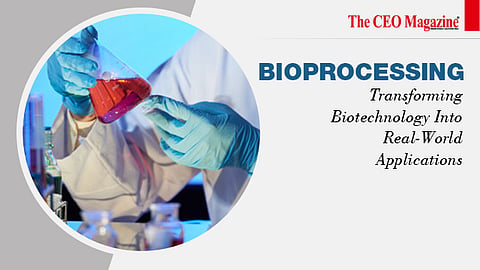
- News
- Women
- Magazine
- IndustryIndustry
- InsightsInsights
- Success Stories
- PublishPublish
- ContactContact
- Media KitMedia Kit

Bioprocessing
Transforming Biotechnology Into Real-World Applications
Bioprocessing is the term used to describe the use of living cells, enzymes, and microorganisms to create and process biological products, such as drugs, vaccines, and biofuels.
This is an essential field for the biotechnology industry, as it provides a means to translate laboratory discoveries into practical, real-world applications. In this article, we will explore the basics of bioprocessing, including its techniques, applications, and future prospects.
Bioprocessing is the process of using living cells or biological components to produce a product or material of commercial value. The technique can involve fermentation, which is the process of using microorganisms to produce a product or material or culturing cells in a bioreactor.
Bioprocessing can also involve downstream processing, which is the purification of a product or material once it has been produced.
Bioprocessing has become an essential field for the biotechnology industry, as it allows scientists to create products such as medicines and biofuels using biologically based materials.
The applications of bioprocessing are wide-ranging, with the field having a significant impact on numerous industries, including pharmaceuticals, biotechnology, food and beverage, and biofuels. Here are some of the applications of bioprocessing:
Pharmaceuticals: Bioprocessing is crucial for the development and production of biopharmaceuticals, such as insulin and vaccines, which are created from living cells.
Biotechnology: Bioprocessing is used to produce enzymes, proteins, and other biologically based materials that are used in the field of biotechnology.
Food and Beverage: Bioprocessing creates food and beverage products, such as cheese and beer, through fermentation.
Biofuels: Bioprocessing is used to create biofuels from biomass materials, such as ethanol and biodiesel.
The future of bioprocessing is bright, with the field set to play an increasingly critical role in developing new technologies and products. Here are some of the future prospects of bioprocessing:
Continuous Processing: Continuous processing is a bioprocessing method that involves continually feeding materials into a bioreactor. This technique has the potential to reduce the time and cost of bioprocessing and could become a standard approach in the industry.
Gene Editing: Gene editing technologies, such as CRISPR, have the potential to revolutionise bioprocessing by allowing scientists to more precisely engineer biological systems for the production of specific materials.
Bioreactors: The development of new and advanced bioreactors will improve the efficiency and productivity of bioprocessing, leading to faster and more cost-effective production of biological products.
Bioprocessing is a crucial field for the biotechnology industry, providing a means to produce biological products of commercial value. The applications of bioprocessing are wide-ranging, with the field having a significant impact on numerous industries.
The future of bioprocessing is bright, with new technologies and techniques set to revolutionise the field and transform how we create and process biological products.
Follow us on Google News
